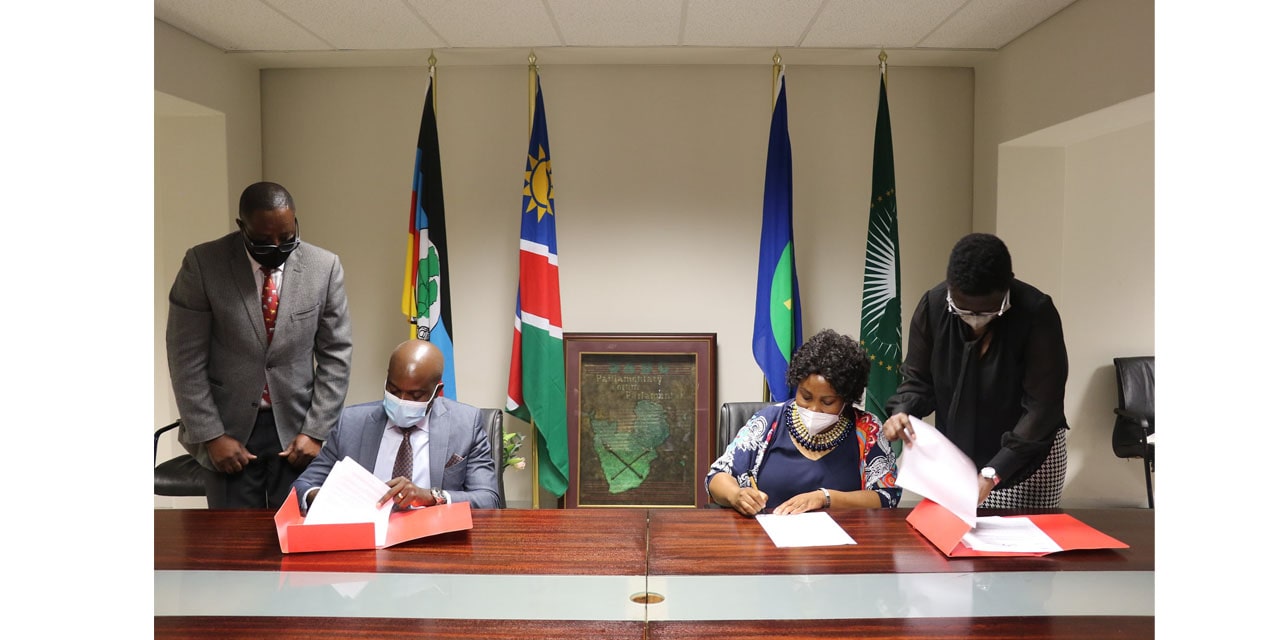A MEMORANDUM of Understanding to empower Members of Parliament of SADC member states to effectively carry out their oversight function was signed between the SADC Parliamentary Forum and the SADC Public Accounts Committee in Windhoek yesterday.
The MoU was signed by the chairperson of the regional Public Accounts Committee, Warren Mwambazi and the secretary general of SADC PF, Boemo Sekgoma during their visit to Namibia this week.
The Public Accounts Committee is to exercise oversight function over public finances as well as promote good governance in the SADC region. The chairperson of the SADC Standing Committee is on a three-day visit to Namibia that started yesterday, confirmed National Assembly spokesperson David Nahogandja to the Windhoek Observer today. Namibian MPs Dudu Murorua and Peter Kazongominja are part of the Mwambazi delegation. Murorua chairs the National Assembly Public Accounts Committee, while Kazongominja is his counterpart in the National Council.
One of the key initiatives of the SADC Public Accounts Committee is to develop model laws which will act as standards that will serve as guiding legislative benchmarks for national parliaments, says Sekgoma during her address of the forum today while engaging stakeholders. She further went on to state that the development of model laws is testament to the forum’s belief in the rule of law, which makes it paramount to spearhead the domestication of international best practices.
Hence. the rationale behind the development of a SADC model law on public finance management (PFM). SADC committee aims to provide platforms for parliaments and parliamentarians to promote and improve regional integration of the region, through parliamentary involvement, while the committee remains an autonomous and independent association of public account committees from SADC states established. The body was established in 2003, with the sole purpose of promoting mutual support and foster exchange of ideas, knowledge and experience.
It also acts as a recognized voice of the public accounts committees within the SADC community, in which it promotes accountability, good governance and transparency within SADC states. The public accounts committee assists parliaments in holding the government accountable for their usage of public funds and resources, by examining the public accounts.
Political science professor Henning Melber, admits that the limitations to parliamentary work caused by the Covid-19 pandemic during most of the last two years are of course a factor to be considered when judging performance of parliaments.
He said that, “even President Geingob was critical about the lack of delivery when it comes to the numerous bills not processed further and the enormous backlog”. Melber adviced MPs in Namibia to pull up their socks in various areas.
Among these, the analyst said, is the requirement to properly report their income and assets, as a matter of transparency and accountability. “We still have MPs who do not comply with these rules without being punished”, he continued. Another flaw is the high number of MPs who are ministers or deputy ministers. ”While parliamentarians as lawmakers should control the executive, they are to a large extent congruent, which makes any serious control meaningless due to overlapping interests and identities.”
It also hampers the work of parliamentary committees, who should promote subject related matters and where necessary should also investigate, Melber sayid when asked if there has been sufficient allocation of funds to parliament to be financially proactive in their oversight function. ”If funds are being allocated to parliament they should be used in the best interest of the public service delivery and parliamentarians should be held accountable as stipulated by the public accounts committees mandates,” Melber pointed out.




